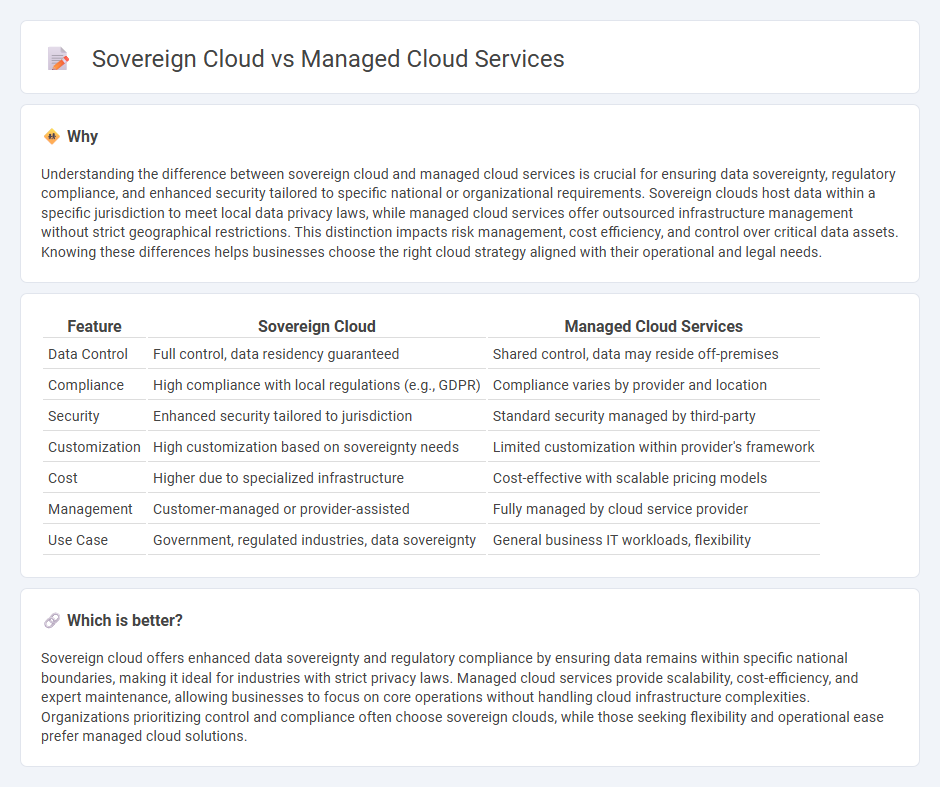
Sovereign cloud ensures data sovereignty by storing and processing information within specific national or regional boundaries, complying with local regulations and enhancing security. Managed cloud services provide outsourced management, maintenance, and support for cloud infrastructure, enabling organizations to focus on core business activities while benefiting from expert handling. Explore the differences and benefits of sovereign cloud versus managed cloud services to determine the best fit for your organization's needs.
Why it is important
Understanding the difference between sovereign cloud and managed cloud services is crucial for ensuring data sovereignty, regulatory compliance, and enhanced security tailored to specific national or organizational requirements. Sovereign clouds host data within a specific jurisdiction to meet local data privacy laws, while managed cloud services offer outsourced infrastructure management without strict geographical restrictions. This distinction impacts risk management, cost efficiency, and control over critical data assets. Knowing these differences helps businesses choose the right cloud strategy aligned with their operational and legal needs.
Comparison Table
| Feature | Sovereign Cloud | Managed Cloud Services |
|---|---|---|
| Data Control | Full control, data residency guaranteed | Shared control, data may reside off-premises |
| Compliance | High compliance with local regulations (e.g., GDPR) | Compliance varies by provider and location |
| Security | Enhanced security tailored to jurisdiction | Standard security managed by third-party |
| Customization | High customization based on sovereignty needs | Limited customization within provider's framework |
| Cost | Higher due to specialized infrastructure | Cost-effective with scalable pricing models |
| Management | Customer-managed or provider-assisted | Fully managed by cloud service provider |
| Use Case | Government, regulated industries, data sovereignty | General business IT workloads, flexibility |
Which is better?
Sovereign cloud offers enhanced data sovereignty and regulatory compliance by ensuring data remains within specific national boundaries, making it ideal for industries with strict privacy laws. Managed cloud services provide scalability, cost-efficiency, and expert maintenance, allowing businesses to focus on core operations without handling cloud infrastructure complexities. Organizations prioritizing control and compliance often choose sovereign clouds, while those seeking flexibility and operational ease prefer managed cloud solutions.
Connection
Sovereign cloud and managed cloud services intersect by providing secure, compliant cloud infrastructure tailored to regulatory requirements, especially for government and enterprise data sovereignty. Managed cloud services enhance sovereign cloud environments by delivering expert oversight, operational efficiency, and continuous compliance monitoring. Together, they ensure controlled access, data privacy, and reliable cloud resource management aligned with regional legal frameworks.
Key Terms
Data Residency
Managed cloud services offer businesses scalable infrastructure with flexible data management options but often host data across international locations. Sovereign cloud emphasizes strict data residency by ensuring data remains within specific national borders, complying with local regulations and enhancing data sovereignty. Explore more to understand which cloud solution aligns best with your organization's legal and operational needs.
Compliance
Managed cloud services provide businesses with scalable infrastructure and proactive monitoring while ensuring adherence to general industry compliance standards such as GDPR, HIPAA, and ISO 27001. Sovereign cloud emphasizes data residency, sovereignty, and stringent regulatory compliance tailored to specific national laws, offering enhanced control over data privacy and security. Explore detailed comparisons and compliance benefits to determine the best solution for your organization's regulatory needs.
Control
Managed cloud services offer streamlined IT infrastructure management with shared control between clients and providers, ensuring efficient resource allocation and scalability. Sovereign cloud emphasizes data sovereignty and strict regulatory compliance, granting organizations full control over data residency and access policies. Explore how these cloud solutions differ in control mechanisms to determine the best fit for your enterprise security and governance needs.
Source and External Links
What Is a Managed Cloud Service? - Managed cloud services involve outsourcing the management of an organization's cloud infrastructure to a third-party provider responsible for configuration, security, maintenance, and optimization, allowing businesses to focus on core activities while accessing cloud resources via subscription and without handling hardware or software upkeep.
What Is Managed Cloud? | IBM - Managed cloud services provide full or partial control of a client's cloud resources through a service provider who handles migration, optimization, security, and upgrades, enabling organizations to reduce costs and complexity by outsourcing cloud management tasks on public, private, or hybrid environments.
What are cloud managed services? - Cloud managed services refer to third-party management of cloud platforms encompassing deployment, migration, maintenance, and 24/7 support, delivering benefits like cost savings, automatic upgrades, improved security, disaster recovery, and rapid issue resolution for enhanced operational efficiency.
 dowidth.com
dowidth.com